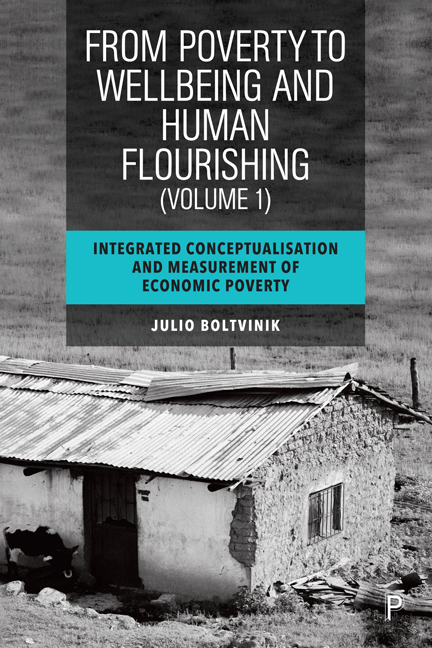 From Poverty to Well-Being and Human Flourishing
From Poverty to Well-Being and Human Flourishing Foreword
Published online by Cambridge University Press: 28 March 2024
Summary
Poverty has been a factor in history almost since time immemorial. It is only since the Industrial Revolution in the late eighteenth century that the idea of mass material well-being has become possible. Political Economy began around that time in Britain, France and Italy. In England at the time, the relief of the poor was supervised by the Church in every parish. Those who could not work – the elderly, the disabled, women with children – were called paupers. They received relief from rates collected by the Church from the local better-off households. The category ‘poor’ was applied to daily workers, mainly working on the land, who received a wage which traditionally was enough to feed the worker, his wife and their children.
It was when inflation of wheat (corn) prices occurred in the decade following the French Revolution that rates were collected for the working poor as well. At this stage Thomas Malthus conceived the idea that population grew at a geometric rate but food output only at arithmetic rate, hence there was a danger of overpopulation. His real purpose was to say that the working poor should not receive payments in addition to their wage since they would only breed more children and the money (paid in rates by the rich) would be wasted. David Ricardo, the most influential economist of his time and for centuries later, confirmed Malthus’s view.
Political Economy became hostile to any idea of relieving poverty as inimical to the laws of the market. It took a century of democratic struggle to broaden the franchise as well as the First World War to bring about a universal franchise. It was then that the idea of income redistribution from the rich to the poor was introduced in Political Economy by Arthur Cecil Pigou (I have discussed this in my Poverty of Political Economy, Harper and Collins, 2023).
It took another world war to establish the idea that relief of poverty was the task of the government. This was especially so because democracy had spread across the world. International agencies were set up and began to make comparisons between nations. We became conscious of advanced versus emerging economies.
- Type
- Chapter
- Information
- From Poverty to Well-Being and Human FlourishingIntegrated Conceptualisation and Measurement of Economic Poverty, pp. xx - xxiiPublisher: Bristol University PressPrint publication year: 2023
